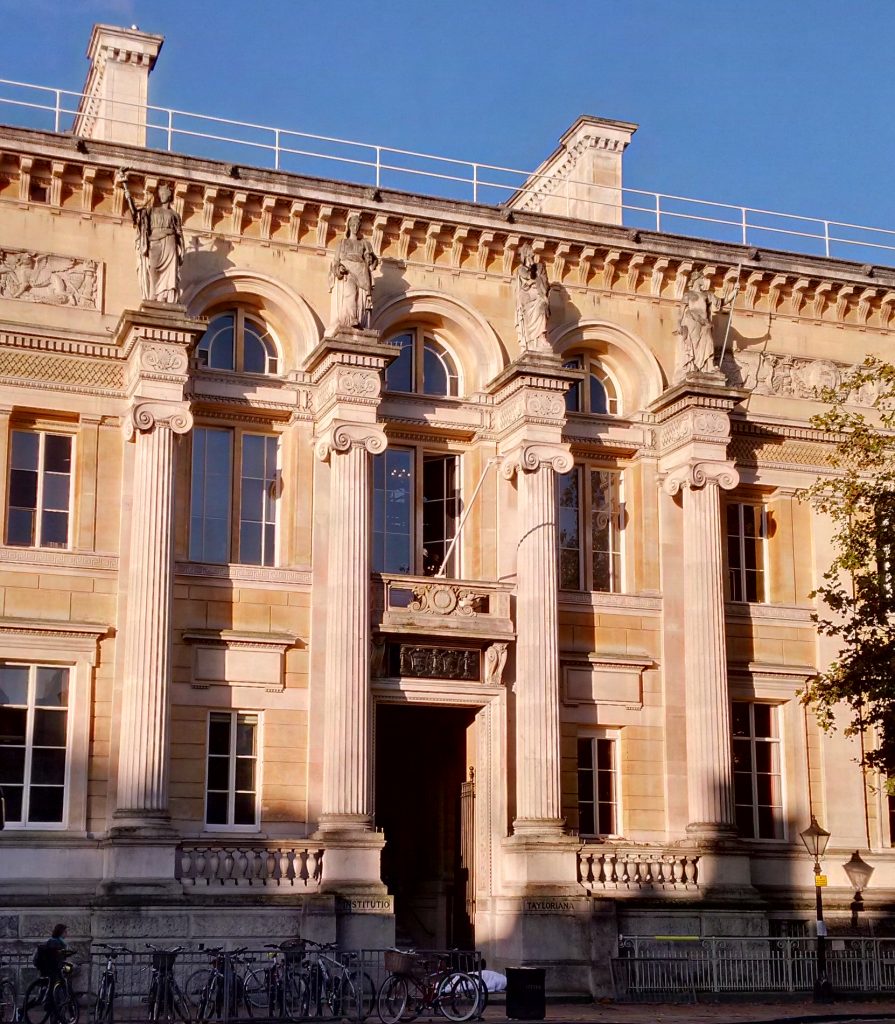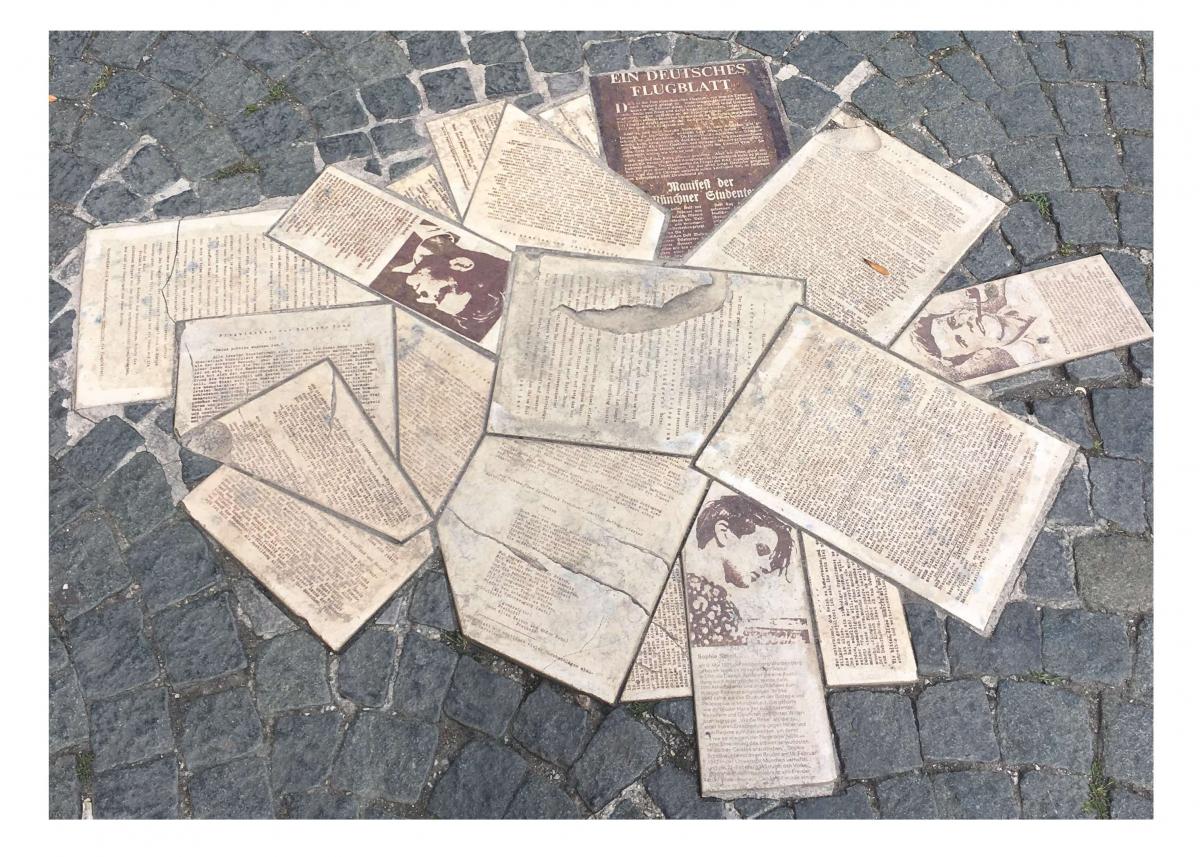This blog post was written by Stephanie Long and Sarah Wadsworth, who are in the final year of their degrees in Spanish. Here, they interview Global South Visiting Fellow, Dr Analía Gerbaudo and discuss literature and political activism, and the role of the translator. Dr Gerbaudo gave this interview in Spanish, and Stephanie and Sarah have translated it into English. As this interview is quite long, we will be publishing it in two parts – check back next week for part 2.
At the end of 2019, we were fortunate enough to have the opportunity to interview Dr Analía Gerbaudo, a Global South Visiting Fellow appointed by the Research Centre for Humanities (TORCH) here in Oxford. She is Professor of Literary Theory and Didactics of Language and Literature at the National University of Litoral in her home country of Argentina, as well as the director of the independent publishing house Vera cartonera, and editor-in-chief of the online literary journal, El Taco en la Brea, which she founded in 2014. Given that one of the key aims of the TORCH project is to help diversify the curriculum at Oxford University, it seems only fitting that such a talented individual with involvement in the “cartonero” movement in Argentina – a movement dedicated to providing quality literature at an affordable price – should have received this appointment. “Translation is necessary in order for one to share texts,” Dr Gerbaudo tells us in one of her answers. For that reason, we feel privileged to have conducted and translated from Spanish the interview presented below. It is a pleasure to share with others Dr Gerbaudo’s obvious knowledge and experience.
SL & SW: Tenemos el privilegio de tener una entrevista con usted aquí en Oxford. En el verano, usted fue nombrada por la organización TORCH (The Oxford Research Centre in the Humanities) como una << Global South Visiting Fellow >>. Según usted, ¿en qué consiste dicho nombramiento y cómo se relaciona con sus investigaciones literarias?
AG: Resulta complejo expresar con palabras lo que la experiencia habilitada por este nombramiento de TORCH me ha permitido. Se trata de algo mucho más complejo que la ya enorme posibilidad de transmitir en uno de los centros de producción intelectual más prestigiosos del mundo los resultados de mis investigaciones (siempre repito que el mapa mundial de los estudios literarios tiene tres grandes polos situados en Francia, en Estados Unidos y en Inglaterra): para alguien que estudia los procesos de institucionalización de las disciplinas, conocer las condiciones de producción de la Universidad de Oxford ya es, de por sí, una experiencia intraducible (es decir, es necesario atravesarla, no hay otro modo de sintetizar las sensaciones que uno siente cuando descubre estas increíbles bibliotecas, los equipadísimos espacios de trabajo, los edificios cuidados, los lugares de recreación, la universidad misma en su conjunto).
Y en esa línea, hay algo de la sociabilidad académica que me ha parecido muy interesante. Me refiero al modo en que los profesores que confiaron en que mi visita podría realizar algún aporte han organizado los coloquios, los workshops y las presentaciones: se trató de un trabajo realizado con una responsabilidad, un profesionalismo y una obsesión que merecen verdaderamente destacarse (además de donarme su tiempo para organizar cada detalle: recordemos que el filósofo francés Jacques Derrida nos advierte que el único bien del que se tiene derecho a ser avaros es el tiempo dado su carácter irrecuperable). El trabajo que han realizado Stefano María Evangelista, Ben Bollig y Laura Marcus es absolutamente imposible de resumir en dos líneas de una entrevista. Gracias a sus intervenciones se generaron interesantísimas conversaciones con otros profesores participantes de las actividades: con Gisèle Sapiro (CNRS, EHESS, París) trabajo desde el año 2011, pero antes de esta estadía nunca había conversado con Peter McDonald ni con María del Pilar Blanco ni con Patricia Novillo-Corvalán. Es impresionante lo que ha sucedido porque si bien trabajamos mucho durante mis semanas en Oxford, sobre el cierre de la experiencia empezaron a aparecer proyectos de continuidad de la conversación: traducciones, publicaciones en la editorial cartonera que dirijo y un largo etcétera que involucra a este grupo de personas que he mencionado.
SL & SW: We’re privileged to have an interview with you here in Oxford. In the summer, you were appointed by the TORCH organisation (The Oxford Research Centre in the Humanities) as a “Global South Visiting Fellow”. What does such an appointment involve, and how is it connected with your literary research?
AG: It is hard to express in words just what experience this TORCH appointment has afforded me. It goes far beyond the already enormous opportunity of sharing the results of my research in one of the most prestigious centres of intellectual output in the world (I have always said that the world map of literary studies has three large poles located in France, the United States and England). For someone who studies the processes of institutionalisation within disciplines, knowing the environment of the University of Oxford is already, in itself, an indescribable experience. That is to say, one has to go through it, there is no other way to accurately sum up the sensations one feels when discovering these incredible libraries, extraordinarily well-furnished workspaces, cherished buildings, recreation areas, the university itself as a whole.
Along those lines, I have been pleasantly surprised by the great enthusiasm and interest of academic circles at Oxford. I refer to the way in which the professors – the ones who believed that something would become of my visit – have organized talks, workshops and presentations: such work was carried out with a responsibility, a professionalism and a dedication that truly deserve to be mentioned, in addition to giving me their time to organize every detail. Let us not forget what the French philosopher Jacques Derrida said: he warned us that the only good that comes from entitled greed is time, given its irretrievable nature. The work that Stefano María Evangelista, Ben Bollig and Laura Marcus have done is absolutely impossible to summarize in two lines of an interview. It is thanks to their involvement, that fascinating conversations have taken place with other professors participating in the activities. I have been working with Gisèle Sapiro (CNRS, EHESS, Paris) since 2011, but before this stay I had never properly spoken to Peter McDonald or María del Pilar Blanco nor to Patricia Novillo-Corvalán. What is truly striking is that although we worked continuously during my weeks in Oxford, towards the end of the experience, projects continuing the conversation began to appear, including translations, publications in the cartonera publishing house that I am director of, and much, much more all involving the group of people that I mention above.

SL & SW: Un artículo publicado por el blog de la facultad de Humanidades de la universidad nos dice que: “Las obras de la doctora Gerbaudo abordan la actual y complicada cuestión de la relación entre los estudios literarios y el activismo político”. ¿Cómo describiría esta relación entre la literatura y el activismo? ¿Se considera usted una activista política?
AG: Hay sobre este punto una larga deriva de una conversación y de una enseñanza de Gisèle Sapiro. Los trabajos de Sapiro muestran que no hay un divorcio entre autonomía y política, como se nos suele hacer creer: nadie le pagaba a Sartre ni a Zola por sus asunciones políticas que atravesaban su filosofía y su literatura. Mis trabajos siguen esa línea abierta por Sapiro: ninguna de las dos somos neutrales. Nuestras posiciones políticas se advierten en todos y cada uno de nuestros trabajos y en nuestras acciones públicas, incluidas nuestras investigaciones.
Suelo hablar en mis escritos de “políticas de exhumación”. Jacques Derrida ha escrito, en un texto memorable, “One transforms while exhuming”. Exhumar prácticas clandestinas de enseñanza de teorías literarias y de literatura censuradas durante el terrorismo de Estado en Argentina así como exhumar prácticas que dan cuenta de la continuidad de políticas económicas, culturales y simbólicas de la dictadura, aún bajo el orden “democrático”, es parte de mi trabajo de investigación. Si esas intervenciones pueden considerarse una forma de activismo, entonces se podría decir que soy una activista. Creo y sigo, a pesar de todo (es decir, a pesar de que no pueden tanto como uno quisiera), una tradición francesa que apuesta al poder de las palabras. Trabajamos con palabras y en ese trabajo hay una potencia y una peligrosidad notable. No por casualidad durante la dictadura argentina era complejo hacer circular un texto como How to Do Things with Words.
SL & SW: An article published by the University’s Humanities faculty’s blog tells us: “Dr Gerbaudo’s work tackles the difficult, charged and extremely topical question of the relationship between literary studies and political activism.” How would you describe the relationship between literature and activism? And would you consider yourself a political activist?
AG: A large amount of work by Giséle Sapiro, derived from conversations and her teaching, deals with this subject. Her work demonstrates that neither autonomy nor politics can be divorced from each other, as we are often led to believe: nobody paid Sartre or Zola to include the political suppositions that run through their philosophy and literature. My own work follows the thread drawn by Sapiro: that neither of the two are neutral. Our political stances are apparent in each and every part of our work and in our public activities, including our research.
I often talk about the “politics of exhumation” in my writing. Jacques Derrida wrote in one memorable text: “One transforms while exhuming”. Exhuming clandestine teaching practices of literary theories and literature censored during state terrorism in Argentina, as well as exhuming practices that account for the continuity of economic, cultural and symbolic policies of the dictatorship, even under the “democratic” order, constitute part of my research work.
If these interventions can be considered a form of activism, then you could say I’m an activist, despite everything. I mean to say we cannot do as much as one would like to. I believe in and follow a French tradition that gambles on the power of words.We work with words and in such a labour, there is remarkable power as well as a marked danger. It’s no coincidence that during the Argentinian dictatorship it was difficult to circulate texts such as How to Do Things with Words.
SL & SW: El artículo dice también que usted es una “traductora activa”. ¿Qué significa ser una traductora de obras argentinas y qué opina de traducirlas de español a inglés? Por otro lado, para usted, ¿qué es lo que más le gusta de la traducción?
AG: La traducción es una herramienta fundamental, en especial en países de preponderancia monolingüe como Argentina: lamentablemente nuestro sistema educativo no afianza la enseñanza de lenguas extranjeras, ni siquiera el portugués que es la lengua que se habla en uno de nuestros países vecinos, Brasil. Por lo tanto traducir es necesario si uno quiere compartir con los estudiantes los textos que ayudan a complejizar ideas, análisis, metodologías, perspectivas de investigación, de reflexión, de pensamiento. En ese sentido, mis traducciones son de textos del francés y del inglés al español. Elijo, en cada ocasión, textos que me permitan introducir categorías teóricas o maneras de leer que problematicen las discusiones recortadas en el campo nacional y, si se quiere, latinoamericano, ya que solemos publicar nuestras traducciones en revistas on line con acceso abierto.
El inglés es hoy la lingua franca de la ciencia. ¿Cómo no ponerse contento cuando un texto o una idea se pueden hacer circular por canales que permitan su diseminación por los espacios por los que esta lengua transita?
SL & SW: The article also says that you are an “active translator”. What does it mean to be a translator of Argentinian literature, and what is your opinion on translating them from Spanish to English? On the other hand, what do you enjoy most about translation?
AG: Translation is a fundamental tool, especially in countries like Argentina where monolingualism is dominant. Unfortunately, our education system hasn’t acted to strengthen the teaching of foreign languages, not even with Portuguese – the language spoken in one of our neighbouring countries, Brazil. Therefore, translation is necessary in order for one to share texts with students that help them deal with more complex ideas, analyses, methodologies, research perspectives, reflection, and thought. In that sense, my translations are from French and English into Spanish. At every opportunity, I select texts that allow me to introduce theoretical categories or ways of reading that consider the problems found in discussions cut short in the national sphere, and if you like, the Latin American sphere, too, since we usually publish our translations in online magazines with open access.
English is the lingua franca of science today. How can one not be pleased when a text or an idea can circulate by channels allowing their dissemination in spaces where English permits them movement?
Join us next week for the concluding part of this interview…



